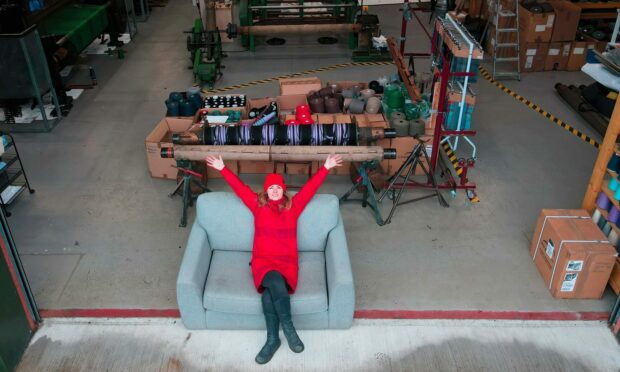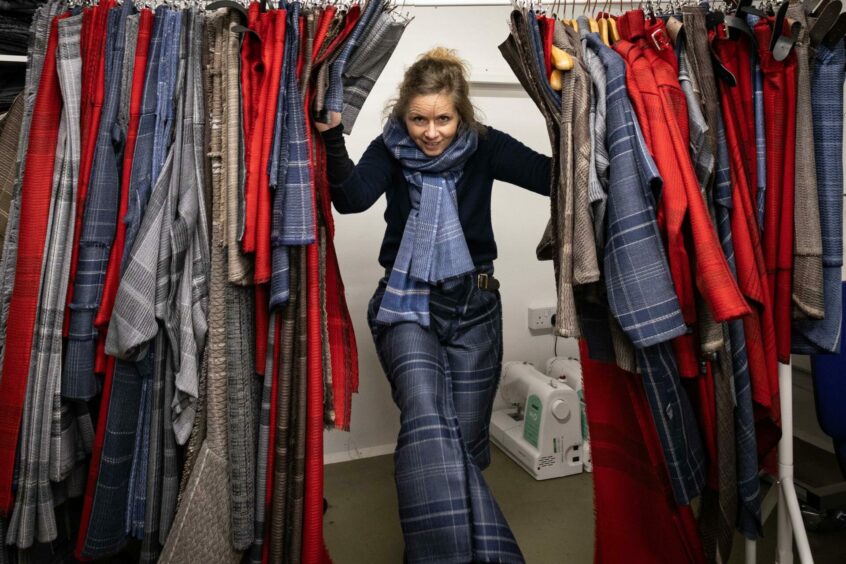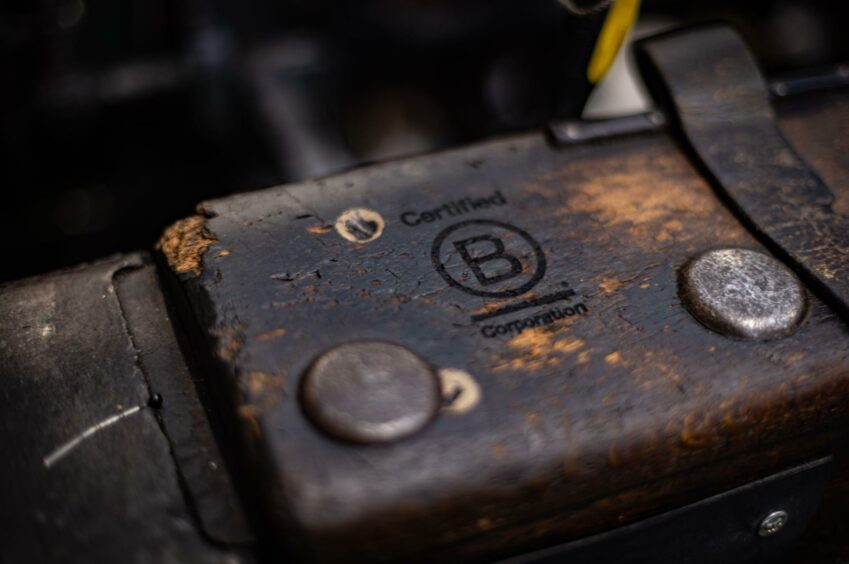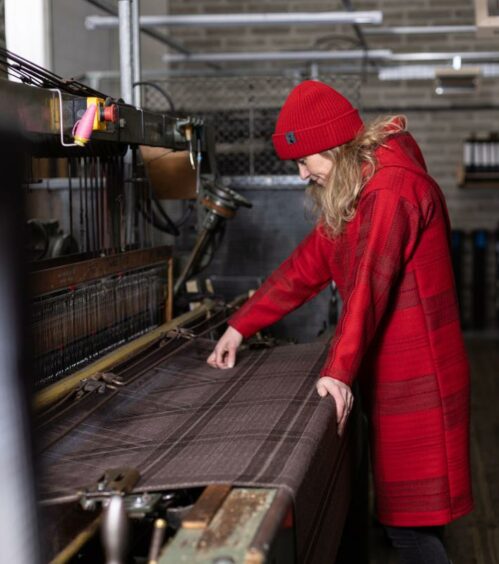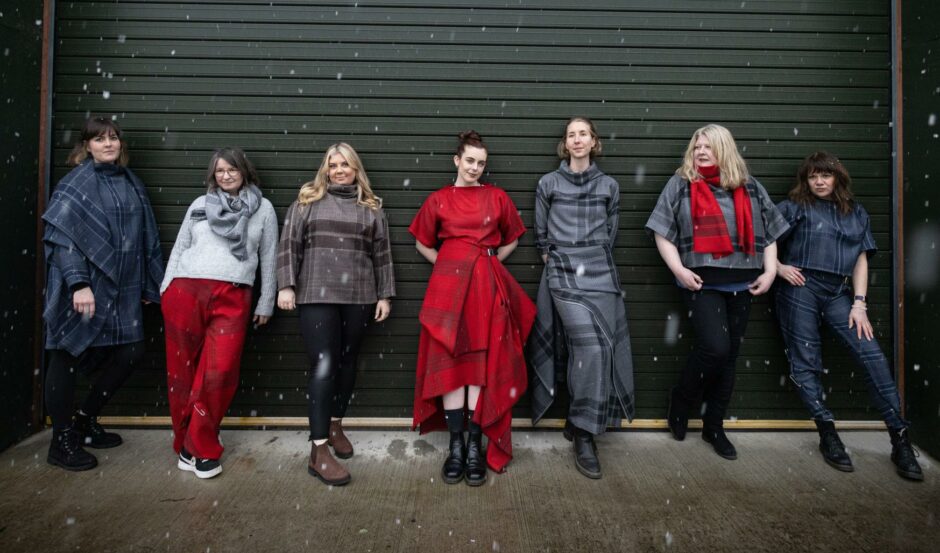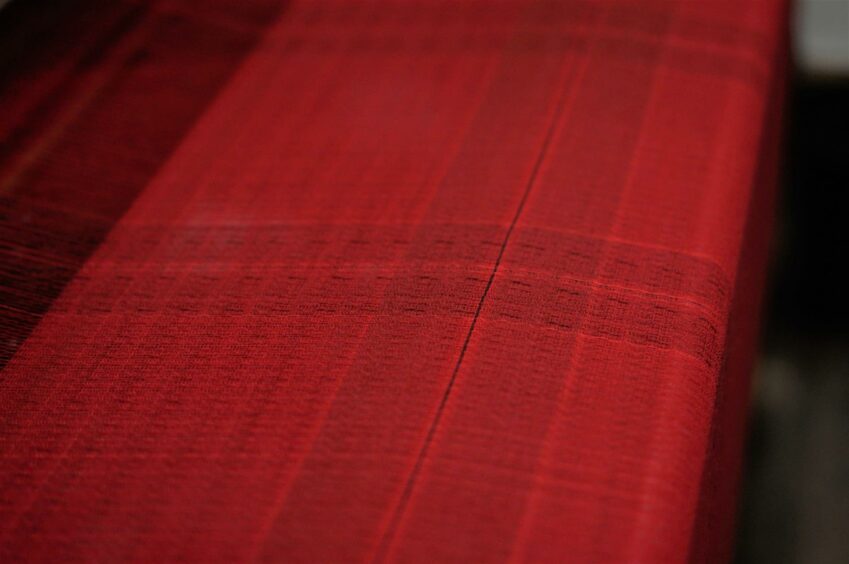Prickly Thistle Highland weaving mill founder Clare Campbell says she is waging a “fast-fashion war” ahead of her visit to New York for this year’s Tartan Week Scottish showcase.
Ms Campbell insists “only 1% of clothing is recycled” currently, incurring massive waste and that consumers should act as they used to by buying less and paying more.
The Prickly Thistle founder made her comments as she prepared for New York Tartan Week, taking place April 6- 10, and held for the first time in two years due to the pandemic.
The event celebrates all things Scottish culminating in a giant parade featuring massed bands and pipers down Sixth Avenue on April 9.
The Black Isle company has also announced it has become the first textiles producer in Scotland to achieve celebrated “B Corp” status recognising its ethical standards.
Ethical certification married with legacy looms
Prickly Thistle’s mill was set up in Evanton in East Ross in an empty building in 2018. Prior to that, the last working mill in the region was Hunters of Brora, which closed its doors some years ago.
Some of Prickly Thistle’s oldest looms date back to 1929 – they were previously in a mill in the Scottish Borders and had not been switched on for five years.
The company relocated four looms and other equipment to the Highlands, where it started with three staff, expanded to 15 and is now looking to recruit more if demand increases.
The Black Isle business has operated on a break-even basis since 2018, with any “small surplus” reinvested in people and equipment.
The mill is is keen for new investment, but stresses its new ethical B Corp certification means its articles of association declare “people and planet before profit”.
After initial struggles with failed, then successful crowdfunding efforts, Ms Campbell has built a business firmly anchored on its B Corp ethical certification, which uses a points system from 80 to top marks of 155.
‘B Corp was born in America’
“We are the only B Corp-certified mill in the whole of Scotland,” said Ms Campbell.
“In America, a B Corp certification is something they are very, very aware of. It was born in America.”
What is B Corp and how hard is it to get?
Most people are wearing oil
Ms Campbell is equally passionate about how much oil is used to make fabrics with some still unaware of the issue.
“We are talking millions and millions of tons of oil every year put into fabrics,” she added. “Most people are wearing oil and they don’t realise. When you look at your label, it says ‘highly flammable,’ that is a clue.
“Most people are wearing synthetics, acrylics, polyesters. Over 60% of all clothing is made of oil, that is highly dangerous. There is also this microplastic situation.
“Every time you wash synthetic clothing or polyester, there are thousands of microplastics being released into the water system.”
‘Tartan rebels’ in the Scottish Highlands
“We know bringing back tartan to the Highlands of Scotland would not just be reviving a heritage piece for the region because we are famous for this stuff, but we wanted to bring back something important to our country,” added Ms Campbell.
“We realise we are fighting a fast-fashion war. How do we make [clothing] from natural fibres, how do we make in a way that is not all automated so we can create as many jobs as we can?
“We want to sell less to more people.
“So, for us to survive we need to sell, but for us to help save the planet we need to sell.
“We need to stop all of those oil-based clothes, that is how we square our philosophy.”
Ms Campbell notes although she is an activist, “I don’t chain myself to anything.” What she does do however, is put pressure on governments to be more transparent.
Tartan Week in New York
The Tartan Day parade itself will be “huge” for Prickly Thistle added Ms Campbell, particularly after a two-year enforced absence due to Covid-19.
“It is about recognising the founding fathers in the US and how Scots were so influential on that,” she said. “It is a huge part of the DNA of America – they have this love for Scotland.
“Tartan Week for me is going to be really interesting – we were there in 2019 and we have learned a lot in the last two years.
“It is really going back to the US, which has been by far our largest customer base, speaking to people and saying to them, so you’re wearing tartan, why are you doing that?
“Often people will talk about identity, pride, symbolism, caring about the same thing. For me, that is what clothing is all about, it says who you are.
“We will be marching and joining the parade.
“They are looking for businesses like us, who are not ‘here’s a green eco t-shirt,’ if you buy it, I’ll plant a tree.’ They get that’s just a trick to get them to buy something they don’t need.
Clan tartan system “overly romanticised”
During the week in New York, Ms Campbell will be wearing natural fibre clothes from the Prickly Thistle collection.
However, the clothes will not feature clan tartan: “That system is overly romanticised and commercially exploited – mostly by Scots for commercial gain,” she noted.
“The whole point of the trip is reconnecting with people who love what we do and why we do it – I have a series of events I am attending, speaking at, meeting clients and media partners – building relationships for the future.”
“A polyester shirt can contain 5.6kg of CO2”
Ms Campbell also headed off any potential criticism of flying to New York for Tartan Week.
“So the maths,” she said. “One flight to New York from London is 590kg of CO2 – the plane has 346 seats – so each person is responsible for 1.7kg – a polyester shirt can contain 5.6kg.
“I am going to influence change in a sector that’s worse than aviation and maritime combined – incurring less carbon for the return trip than one shirt – bearing in mind millions of polyester shirts are bought/worn every day.”
What is Tartan Week?
Tartan Week (April 6–10) will feature numerous activities including the famous parade which will this year be marshalled by Dr Who actress, Karen Gillen.
Other activities taking place during the week include:
- Scottish Ceilidh dance workshop
- Discovering Scotland through oral history and storytelling
- National Tartan Day cocktail reception
- Kirkin’ O’ The Tartan – pan-denominational Christian blessing of the tartans of the clans.
